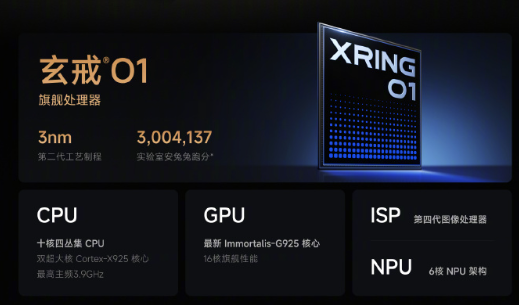Xiaomi unveiled its new 15S Pro smartphone and custom XRING 01 processor on Thursday, signaling its most direct challenge yet to Apple's flagship iPhones. The 15S Pro, priced at 5,499 yuan (approximately $764), falls below the 6,000-yuan threshold for Chinese government consumer subsidies-making it significantly cheaper than Apple's iPhone 16 Pro, which starts at 7,999 yuan, and the Pro Max model priced at 9,999 yuan.
CEO Lei Jun introduced the XRING 01 as Xiaomi's first custom 3-nanometer chip, claiming it surpasses Apple's A18 Pro "on several technical metrics, including the ability to operate a game with less heat." "Apple is still number one," Lei said in Mandarin at the launch event, according to a CNBC translation. "The performance of the XRING O1 shouldn't be seen as putting pressure on Apple, but rather a result of our team's great efforts."
Built on TSMC's second-generation 3nm process, the XRING 01 contains 19 billion transistors and a 109mm² die size. The chip features a 10-core architecture with two Cortex-X925 cores clocked at 3.90GHz, six Cortex-A725 cores, and two Cortex-A520 cores. The GPU is a 16-core ARM Immortalis-G925. It supports LPDDR5T RAM, UFS 4.1 storage, USB 3.2 Gen 2, and Wi-Fi 7.
Xiaomi spent 13.5 billion yuan ($1.87 billion) over four years developing the XRING 01, Lei said in a social media post. While it currently powers only the 15S Pro and a binned version in the Pad 7 Ultra tablet, the company plans to scale its use of in-house chips gradually.
The announcement marks a major step in reducing reliance on suppliers like Qualcomm and MediaTek, which still power roughly 40% of Xiaomi's smartphone shipments, according to Counterpoint Research Partner Neil Shah.
Xiaomi has broader ambitions beyond mobile. At the event, Lei previewed the YU7 SUV, set for release in July. The car will feature Qualcomm Snapdragon and Nvidia Thor chips, with a driving range of 835 kilometers and advanced driver assistance. Pricing was not disclosed.
This follows the company's entry into the electric vehicle market with the SU7 sedan, undercutting Tesla's Model 3 by about $4,000 at launch. The company delivered more than 28,000 vehicles in April, slightly down from over 29,000 in March, following a fatal SU7 crash that prompted tighter advertising regulations in China for driver-assist systems.
Xiaomi will release its Q1 earnings on May 27. In March, the company reported record annual revenue and profit for 2024. Overseas markets now contribute nearly 42% of total revenue. Its shares remain more than 50% higher year-to-date.
Lei announced a plan to invest 200 billion yuan in R&D between 2026 and 2031 and projected 30% revenue growth for 2025. He added that at least 50 billion yuan ($6.9 billion) will be allocated toward chip development over the next decade.






